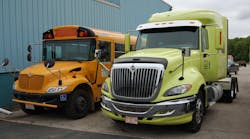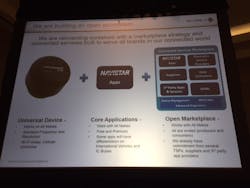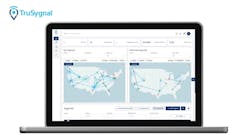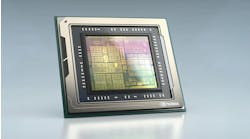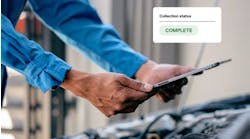ATLANTA. Andrew Dondlinger, vice president and general manager of connected services for Navistar, revealed a multi-layered effort now underway at the OEM to turn its trucks and buses into “open” telematics ecosystems starting early next year, giving its customers the ability to add an electronic logging device (ELD) plus pre- and post-vehicle inspection functionality right into its vehicles without the need to add extra electronic hardware.
“Most telematics companies don’t want to be in the hardware business; hardware is a big costs and it doesn’t make money anymore,” he explained here at the TU-Automotive Connected Fleets USA conference. “They used to make money on that hardware but not anymore.”
Navistar doesn’t want to be in the hardware business either, Dondlinger added, so the new “gatekeeping” telematics platform being built into its trucks is a third-party supplied system.
In essence, he said Navistar is adding the equivalent of a “universal cable TV box” to its trucks – a “box” that should be able to host any type of telematics programming via any type of provider, without fleets or owner-operators needing to switch out hardware in order to switch providers.
“This way, you can change telematics providers without having to rip the hardware out of all of your trucks and install new units – that’s what costs a lot of money,” Dondlinger explained. “It also allows you to consume telematics services ‘a la carte’ so you don’t have to a purchase a set ‘bundle’ that contains things you do not want.”
Staying with the cable TV box analogy, he said it would be like allowing television viewers to switch between cable providers such as Comcast, Verizon, or others without the need for a new box, while ordering just the programs they want – be it only basic TV or sports packages and movie channels, while getting the opportunity to easily remove them as the need arises.
“We want this device to be a ‘gatekeeper’ so all the telematics providers can play on it,” Dondlinger stressed.
Currently, Navistar is prepping an ELD offering for its “gatekeeping” ecosystem for release in early 2017 as well as a pre- and post-inspection system that it will be trying out on its school bus units next year as well.
“That [vehicle] inspection system is not DOT-certified yet; we’re launching it on our buses as part of the effort to get it certified,” he explained. “The reason we’re offering this is that you can automatically tell with 60% to 70% of the ‘checklist’ items if there is a problem or not. So automating that process should lead to more accuracy and more drive time for drivers.”
Dondlinger added that developing this “open architecture telematics ecosystem” for Navistar’s trucks and buses is also an effort to prevent them from becoming “commodities.”
He said the four “characteristics” of a commodity are: it’s a product versus a service; it’s extremely susceptible to shifts in the economy; it is highly cyclical in nature; and is extremely sensitive to supply and demand.
“While commercial trucks are not commodities, the new and used truck markets are subject to the same challenging forces as commodities,” Dondlinger explained. “So we must think differently; our future vehicles will become ‘integration hubs’ as the world becomes more exponentially connected.”
